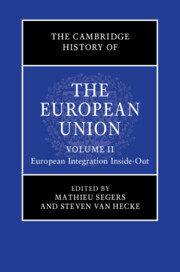Book contents
- The Cambridge History of the European Union
- The Cambridge History of the European Union
- The Cambridge History of the European Union
- Copyright page
- Contents
- Figures
- Tables
- Contributors to Volume II
- Acknowledgements
- Abbreviations
- Reflections on the History and Historiography of European Integration
- Part I Milestones: Treaties and Treaty Changes
- Part II Instruments of Integration
- Part III Narratives and Outcomes
- War and Peace
- Prosperity and Solidarity
- Democracy and Legitimacy
- 23 Ideologies of EU Democracy since 1950
- 24 Democratic Challenges since Maastricht
- Index
- References
23 - Ideologies of EU Democracy since 1950
from Democracy and Legitimacy
Published online by Cambridge University Press: 12 October 2023
- The Cambridge History of the European Union
- The Cambridge History of the European Union
- The Cambridge History of the European Union
- Copyright page
- Contents
- Figures
- Tables
- Contributors to Volume II
- Acknowledgements
- Abbreviations
- Reflections on the History and Historiography of European Integration
- Part I Milestones: Treaties and Treaty Changes
- Part II Instruments of Integration
- Part III Narratives and Outcomes
- War and Peace
- Prosperity and Solidarity
- Democracy and Legitimacy
- 23 Ideologies of EU Democracy since 1950
- 24 Democratic Challenges since Maastricht
- Index
- References
Summary
How democratic were the European Communities, and later the European Union (EU), how democratic did they need to be, and what would this mean in the first place? Throughout the course of European integration, none of the answers was self-evident, and all were the stuff of continuous discursive construction, reconstruction and contestation. In this chapter I trace shifts and clashes in collective imaginations of EU democracy since 1950, exploring how what it made sense to say about EU democracy changed over time. I analyse discourses, or ensembles of ideas, concepts, narratives or categories, through which meaning was given to ‘democracy’, for the case of the EU and its institutional predecessors (for the sake of better readability, I sometimes use the label ‘EU’ to refer both to the EU as such and to its institutional predecessors in this chapter).
- Type
- Chapter
- Information
- The Cambridge History of the European Union , pp. 652 - 672Publisher: Cambridge University PressPrint publication year: 2023

